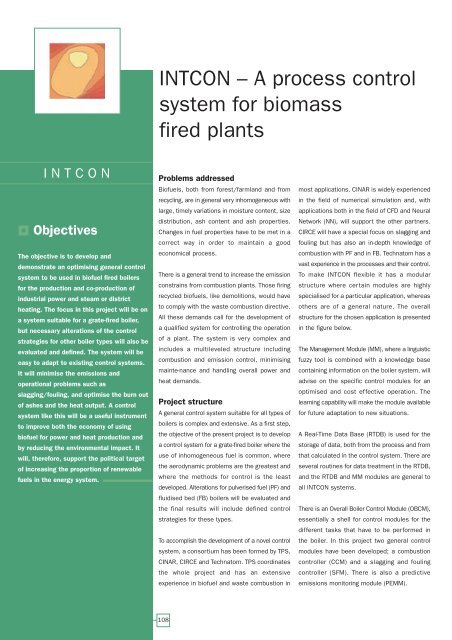European Bio-Energy Projects
European Bio-Energy Projects
European Bio-Energy Projects
Create successful ePaper yourself
Turn your PDF publications into a flip-book with our unique Google optimized e-Paper software.
INTCON<br />
Objectives<br />
The objective is to develop and<br />
demonstrate an optimising general control<br />
system to be used in biofuel fired boilers<br />
for the production and co-production of<br />
industrial power and steam or district<br />
heating. The focus in this project will be on<br />
a system suitable for a grate-fired boiler,<br />
but necessary alterations of the control<br />
strategies for other boiler types will also be<br />
evaluated and defined. The system will be<br />
easy to adapt to existing control systems.<br />
It will minimise the emissions and<br />
operational problems such as<br />
slagging/fouling, and optimise the burn out<br />
of ashes and the heat output. A control<br />
system like this will be a useful instrument<br />
to improve both the economy of using<br />
biofuel for power and heat production and<br />
by reducing the environmental impact. It<br />
will, therefore, support the political target<br />
of increasing the proportion of renewable<br />
fuels in the energy system.<br />
INTCON – A process control<br />
system for biomass<br />
fired plants<br />
Problems addressed<br />
<strong>Bio</strong>fuels, both from forest/farmland and from<br />
recycling, are in general very inhomogeneous with<br />
large, timely variations in moisture content, size<br />
distribution, ash content and ash properties.<br />
Changes in fuel properties have to be met in a<br />
correct way in order to maintain a good<br />
economical process.<br />
There is a general trend to increase the emission<br />
constrains from combustion plants. Those firing<br />
recycled biofuels, like demolitions, would have<br />
to comply with the waste combustion directive.<br />
All these demands call for the development of<br />
a qualified system for controlling the operation<br />
of a plant. The system is very complex and<br />
includes a multileveled structure including<br />
combustion and emission control, minimising<br />
mainte-nance and handling overall power and<br />
heat demands.<br />
Project structure<br />
A general control system suitable for all types of<br />
boilers is complex and extensive. As a first step,<br />
the objective of the present project is to develop<br />
a control system for a grate-fired boiler where the<br />
use of inhomogeneous fuel is common, where<br />
the aerodynamic problems are the greatest and<br />
where the methods for control is the least<br />
developed. Alterations for pulverised fuel (PF) and<br />
fluidised bed (FB) boilers will be evaluated and<br />
the final results will include defined control<br />
strategies for these types.<br />
To accomplish the development of a novel control<br />
system, a consortium has been formed by TPS,<br />
CINAR, CIRCE and Technatom. TPS coordinates<br />
the whole project and has an extensive<br />
experience in biofuel and waste combustion in<br />
108<br />
most applications. CINAR is widely experienced<br />
in the field of numerical simulation and, with<br />
applications both in the field of CFD and Neural<br />
Network (NN), will support the other partners.<br />
CIRCE will have a special focus on slagging and<br />
fouling but has also an in-depth knowledge of<br />
combustion with PF and in FB. Technatom has a<br />
vast experience in the processes and their control.<br />
To make INTCON flexible it has a modular<br />
structure where certain modules are highly<br />
specialised for a particular application, whereas<br />
others are of a general nature. The overall<br />
structure for the chosen application is presented<br />
in the figure below.<br />
The Management Module (MM), where a linguistic<br />
fuzzy tool is combined with a knowledge base<br />
containing information on the boiler system, will<br />
advise on the specific control modules for an<br />
optimised and cost effective operation. The<br />
learning capability will make the module available<br />
for future adaptation to new situations.<br />
A Real-Time Data Base (RTDB) is used for the<br />
storage of data, both from the process and from<br />
that calculated in the control system. There are<br />
several routines for data treatment in the RTDB,<br />
and the RTDB and MM modules are general to<br />
all INTCON systems.<br />
There is an Overall Boiler Control Module (OBCM),<br />
essentially a shell for control modules for the<br />
different tasks that have to be performed in<br />
the boiler. In this project two general control<br />
modules have been developed; a combustion<br />
controller (CCM) and a slagging and fouling<br />
controller (SFM). There is also a predictive<br />
emissions monitoring module (PEMM).

















